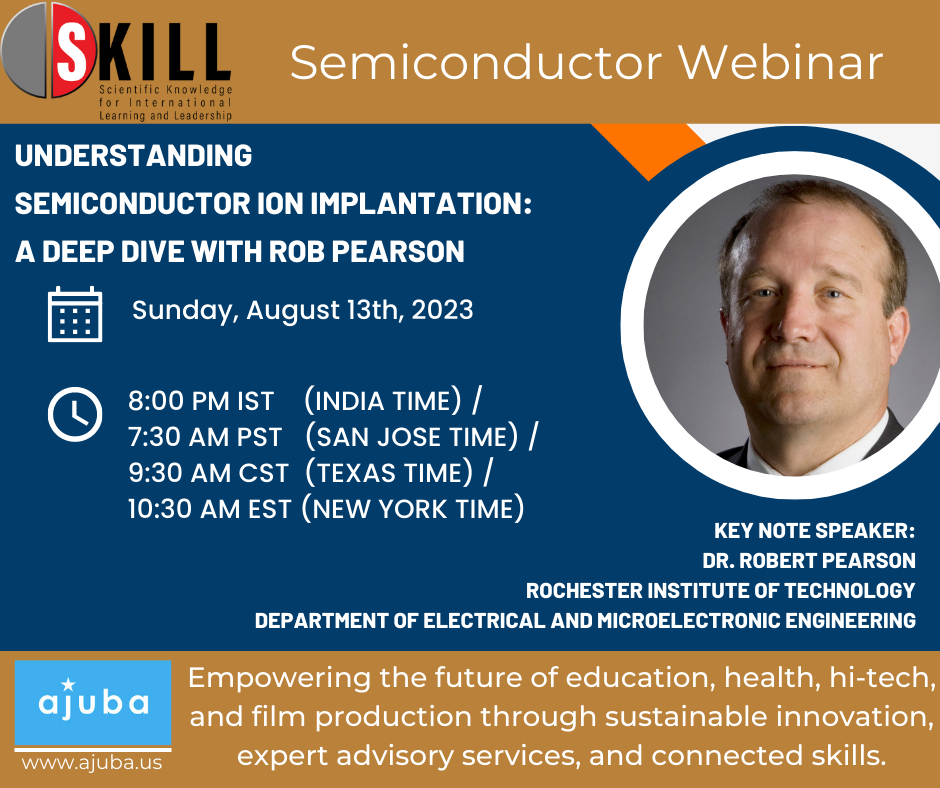We are thrilled to share with you the recording for the insightful webinar on “Semiconductor Ion Implantation” featuring Rob Pearson, an esteemed expert from the prestigious Rochester Institute of Technology (RIT). Click below to see the complete recording.
Semiconductor ion implantation is a fundamental technique used to modify the properties of semiconductors, enabling the creation of advanced microelectronic devices. In this webinar, Dr. Rob Pearson, an accomplished academic and industry professional, will provide an in-depth understanding of this pivotal process.
Key Topics to be Covered:
1. Introduction to Ion Implantation:
- Understanding the basics of ion implantation in semiconductor manufacturing.
- Why ion implantation is essential for the fabrication of advanced semiconductor devices.
2. Ion Implantation Process:
- Exploring the ion implantation process flow and its key steps.
- Key factors affecting ion implantation accuracy and precision.
3. Ion Beam Characteristics:
- Analyzing ion beam characteristics and their impact on implantation results.
- Diving into beam energy, dosage, and implantation profiles.
4. Ion Implantation Applications:
- Examining various applications of ion implantation in semiconductor technology.
- Case studies showcasing successful implementations in real-world scenarios.
5. Challenges and Advances:
- Addressing challenges faced in ion implantation and potential solutions.
- Unveiling the latest advances and trends in the field.
Who Should Attend:
- Students and researchers in semiconductor engineering and microelectronics.
- Faculty who are looking to understand the concepts of semiconductor processes
- Professionals working in the semiconductor industry.
- Anyone interested in gaining insights into semiconductor manufacturing processes.
Speaker:
Rob Pearson
Dr. Robert Pearson is an accomplished academic and researcher in the field of electrical engineering, specializing in microelectronics. He is a dedicated educator with a profound passion for teaching the comprehensive realm of microelectronics, including device, circuit, and process design, as well as manufacturing, testing, and reliability. Dr. Pearson’s journey in the field of microelectronics began during his undergraduate years at the Rochester Institute of Technology (RIT) in 1979, where he conducted independent study under the guidance of Dr. Lynn Fuller. It was during this time that he fabricated the first silicon transistors and solar cells, laying the groundwork for the nation’s inaugural undergraduate Microelectronics BS degree curriculum, which was introduced in 1982.
Rob’s commitment to microelectronics education led him to become the first faculty member hired by the RIT Microelectronic Engineering Program. He holds a Bachelor of Science (B.S.) and a Master of Science (M.S.) in Electrical Engineering from RIT, and while teaching at RIT, he pursued his doctorate in Electrical Engineering from the State University of New York at Buffalo (SUNY Buffalo).
Throughout his career, Rob has played a pivotal role as a founding faculty member in two different universities, RIT and Virginia Commonwealth University. His contributions extended beyond teaching, as he served as the Microelectronic Engineering Department head at RIT from 2008 to 2019. In this role, he oversaw multiple ABET accreditation efforts at both RIT and Virginia Commonwealth University. Additionally, Rob has utilized his expertise as a curriculum and facilities consultant in various countries, including the United States, Mexico, Singapore, and China.
Rob’s teaching and research interests revolve around the intersection of electrical device physics, semiconductor processing, simulation, and characterization. He currently instructs RIT’s CMOS factory course, a unique lab experience where student teams work on three wafer 500nm CMOS lots using RIT’s state-of-the-art ion implanter, i-line stepper, CVD, and plasma etch tools. In this “factory-like” environment, students rotate between different tool groups, gaining hands-on experience and practical knowledge. Furthermore, Rob teaches RIT’s “Semiconductor Process Integration” course, guiding students through the evolution of modern MOSFET processes and devices, from 6-micron channel lengths to nanometer-scale finFETs. The course emphasizes the interconnectedness of materials, processes, and device performance, providing students with a solid foundation to pursue their own research in advanced device manufacturing.
Rob Pearson’s extensive experience, dedication to teaching, and contributions to microelectronics education make him a respected figure in the field. His commitment to nurturing the next generation of engineers and researchers is evident through his teaching endeavors and active involvement in academic committees and conferences, including the University Government Industry Microelectronics Symposium and the Advanced Semiconductor Manufacturing Conference.
